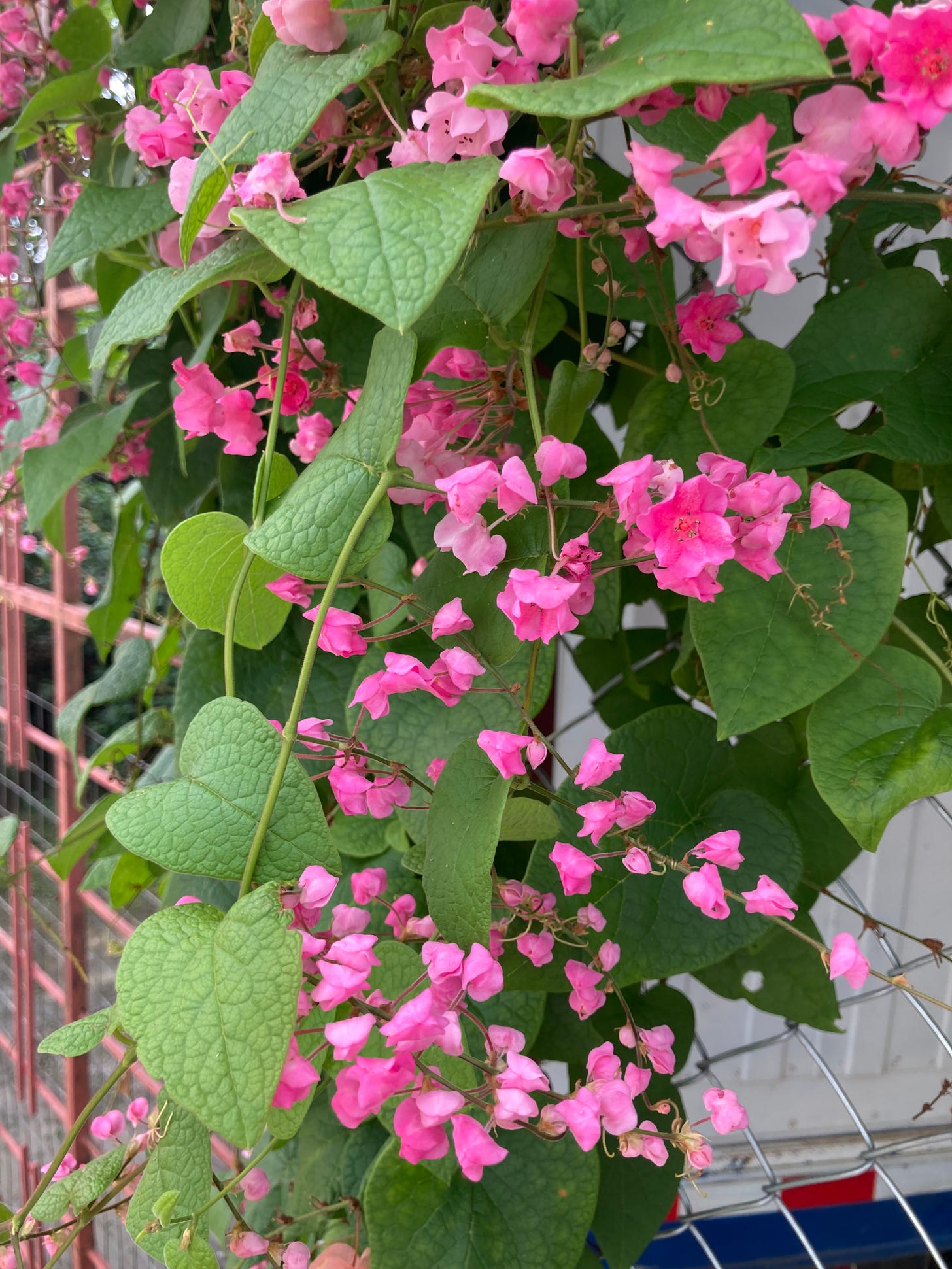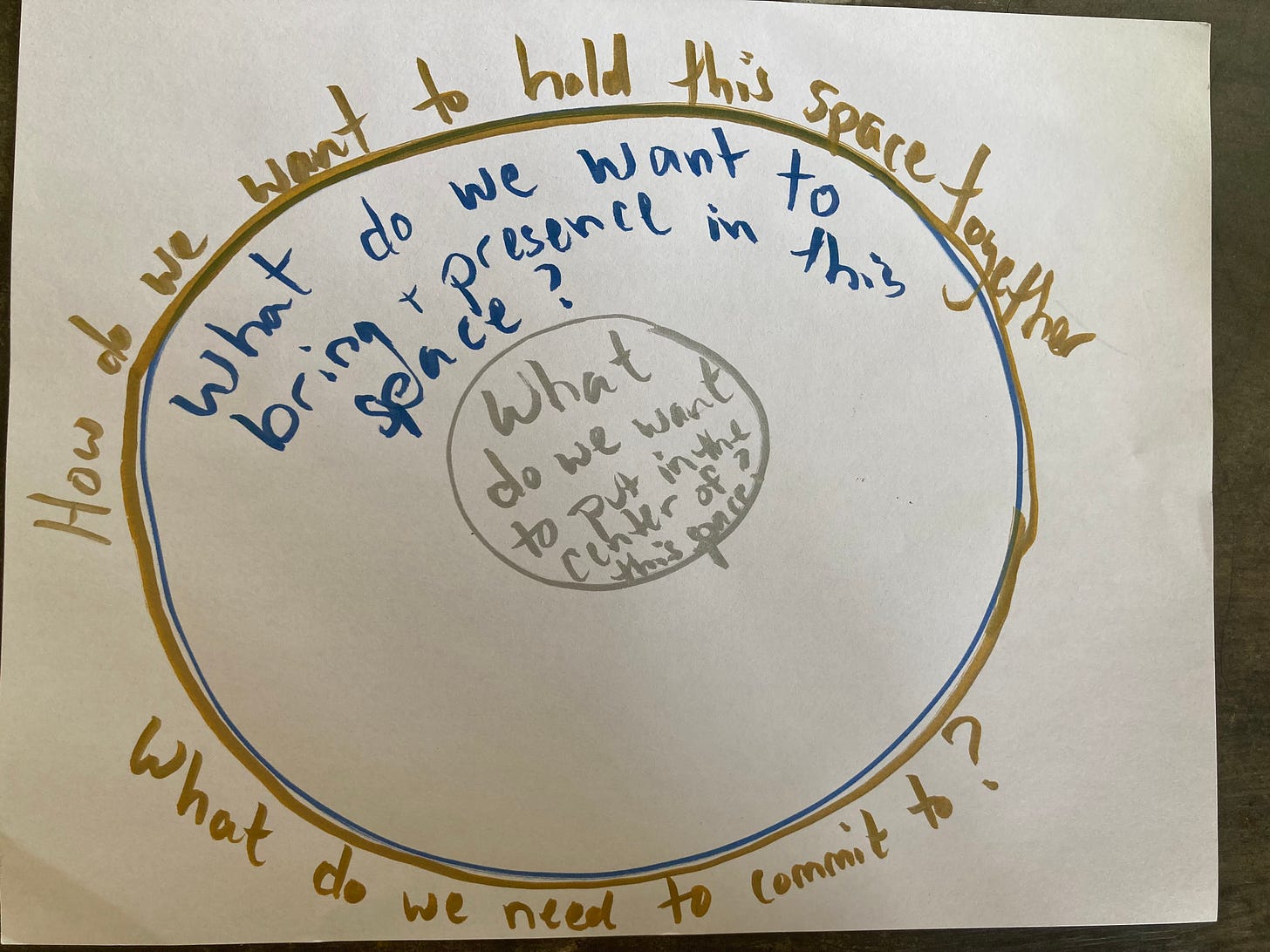What is Stirring and Sticking
Reflections on the International Healing-Centered Education Conference

Dear readers,
As with any rich dialogue, I am sitting with new questions while participating in the International Healing-Centered Education conference this weekend. I want to share some things that are stirring in me. In one of the sessions I attended, the facilitator, Joshua Feliz Martinez - whose work through Usir Consulting focuses on creating spaces of belonging - asked us when we came back from breakout rooms, “What stuck?” This is a simple and powerful prompt for reflection. This is what has stuck, what is sticking, and what is still stirring and moving in me.
Slowing down is healing
I know this from the Plum Village tradition, as this is at the heart of our practice. In, out, deep, slow… And, I am an intense period of doing at the moment (as I have written about previously), and life has been pretty non-stop since the start of the academic year (as it is for perhaps all of us in academic and teaching roles). It is hard to slow down, when you feel like you are on an automatic walkway until the end-of-year break, when there is so much doing that needs done all the time.
I took my class to the opening ceremony of the conference and received so much from it. There were beautiful offerings by several speakers who really set the tone for the space. But what resonated with me the most was the pace, the slowing down. The intentionality with which the speakers spoke. The lack of rushing. The pause between each speaker to share some love in the chat and share brief reflections. The slowing down was immediately healing, and this was a good reminder for me, as much I try in on my own in daily life to practice. The pull of grind culture is hard. This was a good reminder of how healing slowing down - especially slowing down in community - can be.
Space holders need space held for them, too
I am holding space a lot - for my students, for my child - and being in this space yesterday, I realized how infrequently I am being held in a space in a similar way to the ones I try to hold, and how deeply I need that. It is so deeply nourishing to be in space with like-minded and -hearted people who see education as healing and are trying to practice our way towards more justice and peace in the world through education. I love facilitating, and, it was so healing to be in a space where I was just being, just listening.
When is peace education not healing?
I was a presenter in two sessions, one on peace education (which I wrote about last week) and one on community dreamwork. One of the things we talked about with Dr. Angel Acosta in the discussion part of our peace education panel were the overlaps and resonances between peace education and healing-centered education, but also the divergences. One of the things I was talking about was that peace education isn’t always inherently healing-centered, or doesn’t always have healing at the center of it.
After the dialogue, I have been thinking about the question, “When is peace education not healing?” I have been thinking about this as when it doesn’t have well-being at the center, and when it ignores the structural aspects of the system that it is taking place in that are causing harm (this includes implicit and explicity racism and patriarchal dynamics, Eurocentrism, intense schedules, grades…). Peace education is not healing if it is not critical (see the work of Monisha Bajaj), if it lacks an analysis of power or is depoliticized, if it emphasizes and centers Europatriarchal knowledge rather than disrupting it (Minna Salami* describes Europatriachal knowledge as “rooted in the idea that knowledge is something to acquire, own and possess, and subsequently that quanitification and the deductive method are the only worthy ways of knowing”).
Expanding our idea of who is teaching
I had this thought on one of my slides about honoring diverse ways of knowing and epistemic justice, and I was asked to expand upon it in the Q&A. On the slide I wrote: expanding our idea of who is teaching - the land, each other, our bodies, our dreams. The question was about what I meant by this, and how it might be actionable in K-12 US education (I believe it is).
Brazilian educator Paulo Freire coined the phrase “the banking model of education” to describe the all-too-common phenomemon of an orientation of education in which the teacher is the possessor of knowledge, and students come to schools as empty vessels to be filled - to be deposited into like a bank. This idea is not new - Freire first wrote about it in the 1960s - and yet banking systems are still pervasive worldwide, and by the time students get to a graduate-level of education, it is often the internalized and expected form of education. Thus even when I am explicit about trying to disrupt this model and teach otherwise, there can be resistance to a more dialogic form, and an expectation that I will lecture and that is what counts as knowledge.
When I talk about expanding our idea of who is teaching, I mean that in so many ways. I mean listening and learning from our bodies and our intuition - our bodies as holders of wisdom, and our internal ways of knowing. The Latin root of the word education is educare, which means to draw out. For me, the best teaching is drawing out the students’ deepest inner knowing and gifts, and creating space for that wisdom to emerge.
One way that schools harm us is by teaching us to not trust ourselves, teaching us to ignore our bodies, and teaching us that knoweldge and wisdom comes from outside, external sources. Don’t get me wrong - I love learning from external sources! But what I mean here is honoring both, and being able to value and honor our inner wisdom, allow space for it to emerge, and trusting ourselves, our inner wisdom, and our bodies as some of our greatest teachers.
I also mean learning from each other in community. At UPEACE I often hear students say that they learn as much from their classmates as their teachers, and this should be emphasized and valued. We all walk into a classroom and learning community with lived experience that should be valued as a source of knowledge. This is another Freirian principle: that we are all teaching and learning together, that we all play both roles, and that we are beings in a constant process of becoming and lifelong learning.
Finally, and perhaps especially, I mean learning from the land and more-than-human life (including mystery) around and within us, which is part of our learning community. Indigenous knowledge systems are rooted in the land and often involve seeing all of life as relatives and teachers. For those of us who have been disconnected from our indigenous and ancestral ways of knowing and learning, we can begin to relearn by seeing the beings around us as teachers, and treating them respectfully, accordingly.
Community Agreements
In any space I hold or facilitate, I always facilitate a process of co-creating community agreements. I usually ask questions like:
How do we want to be together?
What commitments do we need to agree to in order to have a brave, safe-as-possible space?
How do we create a culture of (imperfect) peace together in our learning community?
We always start from scratch, and treat the agreements as a living document that we can refer back to and change as needed. Here is an example from last year of what that looked like:
Joshua shared some community agreements with us that were very beautiful, and then asked us to go into breakout rooms to discuss them and how we might bring them into our spaces, or how we already do. Some of the agreements were things that would normally be reflected in our classroom agreements, but some weren’t. It got me thinking about:
When we co-create the agreements from scratch, what might we be missing?
The next time I offer this process (next week, in fact), I plan to do it a little differently, by starting with a co-creative process, and then looking at some other agreements together so that we might see if there’s something we might have missed, or something that others have come up with that might enrich our space. I am thinking about the questions:
What do we want to put in the center of this space?
What do we want to bring in and presence in this space?
How do we want to hold this space together? What do we need to commit to for a thriving, welcoming, brave community?
I am currently working out the lesson plan for this in my head, so when I do, I will share it and let you know how it goes :)
If you’d like to check out our session, you can watch it here:
And you can check out the slides here.
Dreamwork Is Magic and Healing
Minna and I co-facilitated a dreamwork work/play-shop, and you can find the video here:
The session was beautiful and powerful and a testament to the power of working with dreams in community. It was a deeply affirming process for us to share this work!
For the workshop, we prepared a pretty cool dreamwork resource document which you can find here. It is two pages but here’s a teaser:
On that note, I want to share with you that we have launched a Substack home for our work, called
where we will be sharing more about our dreamwork collaborations and more (I invite you to subscribe! :). We are also hosting periodic dreamwork gatherings, the next of which will be Oct. 18 at 5:30pm Costa Rica (currently US Mountain) time. Please email me if you would like to be on the list to be notified about these gatherings!On that note, I will share the blessing that Minna wrote for our first Prism of Wisdom post:
Together, may we be like the prism…
slowing down to bend our assumption about wisdom, so that we may perceive the spectrum of wisdom that collectively call each of us home to our unique multi-dimensionality and interbeingness.
There is still one more day of the conference, so there may be more stirrings and stickings (and expansion on the ones above) to come.
Happy Sunday, dear readers!
With love,
Stephanie
*I highly recommend checking our Minna Salami’s book, Sensuous Knowledge, and you can read an interview with her where she describes Europatriarchal knowledge and Sensuous knowledge here.).







Thank you so much for this terrific journey through your recent stirrings and stickings! It really got me thinking (and feeling) and stimulated my own stirrings. I'm also grateful to you for pointing me in the direction of Minna Salami's work and writing which I've got pinned to check out ASAP (I've just downloaded the audiobook for Sensuous Knowledge!). Have a beautiful day :)